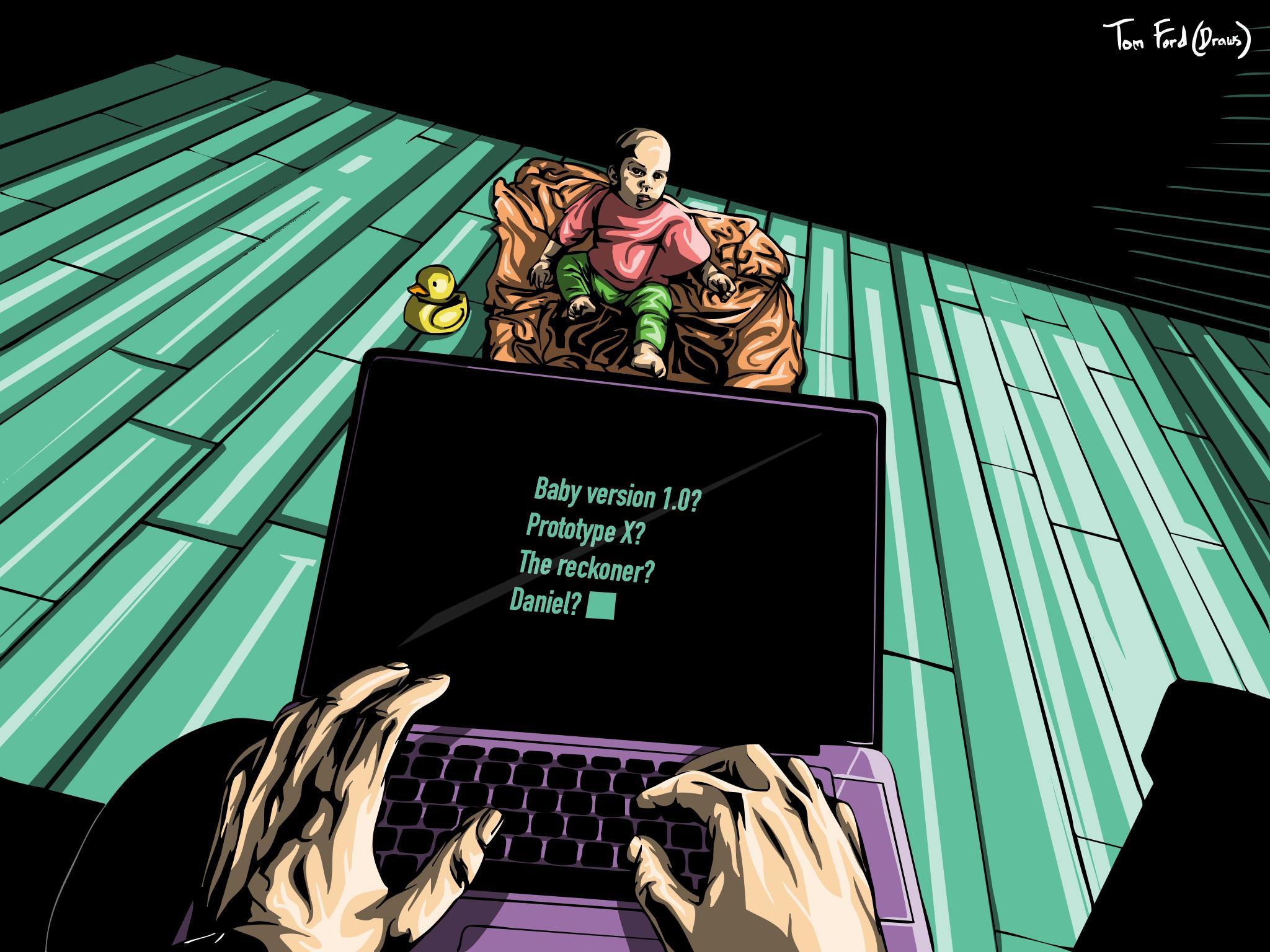What’s your name?
Continuing her series tackling socially unacceptable questions, Christine Manby considers a question that begins with parents and ends with the rest of our lives


Becoming a parent involves a few basic responsibilities like feeding and clothing the child in your care and keeping their tiny fingers from the dog’s mouth or the gas fire. However, it seems to me there is one more parental responsibility that ought to be much higher on the list – giving your child a name they can live with. A name that they won’t spend the whole of their life having to spell out letter by letter, excuse or explain.
Luckily governments all over the world agree. There are strict rules about what you can and can’t name a child in countries such as Sweden where “First names shall not be approved if they can cause offence or can be supposed to cause discomfort for the one using it, or names which for some obvious reason are not suitable as a first name”. Or Denmark, where parents have to choose a name from a pre-approved list of 7,000 monikers.
In France, as recently as 1993, you had to name your child according to a list set down by Napoleon Bonaparte. Needless to say, Chanel and Chardonnay weren’t on it. Though they’ve loosened up on baby names, the French still have a strict special system for naming dogs. Each year is assigned a letter of the alphabet and that’s the letter with which any dog born in that year’s name must start. This year’s letter is P, in case you’re wondering. So Pongo is in and Fido is officially out.
In Germany, where naming law is still stuck in 2017, the “Instructions for Registrars” – issued by the Ministry of the Interior – decree that a child’s first name must provide a clear indication of its gender. Those genders according to said naming law being the old-fashioned ‘male’ or ‘female’. Apparently, one local council approved Nemo on this basis, presumably as a boy’s name thanks to the fish in the eponymous film. Which is interesting, since Nemo was a clownfish and clownfish live in a matriarchal society, where male clownfish have been observed to change gender when the top female fish dies.
Here in the UK, there is no specific law restricting names, but names that are impossible to pronounce or contain obscenities are still likely to be rejected when you come to register them. As are names which contain numbers. So there’s no point trying to give your child a name which will help you to remember your internet password, the most popular of which remains “12345”. It’s a different story in the United States, where rules vary from state to state but in general, the free speech clause of the first amendment is taken to mean that parents have the right to call their children whatever the Sam Hill they like. Such as that other popular internet password, ABCDE. That’s pronounced Ab-sid-ee, by the way. At least, that’s how it’s pronounced in the case of little Abcde Redford from El Paso, Texas.

As Abcde and her mother boarded a South West Airlines plane from Santa Ana, California back to El Paso, the flight attendant booking them in took a sneaky photograph of Abcde’s boarding pass. The photo was subsequently uploaded to social media. It wasn’t long before the pic went viral and was drawn to the attention of Abcde’s mother, who took umbrage at the mocking of her daughter’s name and dug out another photo for a series of click bait articles.
South West Airlines duly apologised for their employee’s unprofessional behaviour, but below the line commentators were split as to who was actually to blame for Abcde’s “humiliation” as her mother put it. Lloyd Luc Stacey on Twitter suggested: “The gate agent was not mocking your daughter, she was mocking the adult who chose that name. The mocking of your daughter lies ahead of her for the rest of her life. Good job Mom!”
But does a life of humiliation lay head for poor Abcde? Maybe not if Abcde becomes as common as Traci (her mother’s name). The most interesting part of the whole Abcde Redford story is perhaps that Abcde is by no means a unique name. There are 328 girls named Abcde in the United States and the name has been steadily growing in popularity since it first appeared in 2009. Why it’s been growing in popularity is anybody’s guess, when it sounds like a cross between an abscess and pleurisy, it won’t get you to the front of the class ahead of Aabriella and it’s not even as easy to type as Qwerty.
While there are, as far as I can tell, no people actually named Qwerty (though it’s still an enormously popular password), in 2014 scientists at the University of Chicago suggested that the layout of the Anglophone keyboard has led to a rise in names beginning with, or containing a majority of, letters from the right hand side of the keyboard. Such names include Olivia, the second most popular UK girls’ name in 2018, and Liam, which was name number two for boys. There’s also been a rise in the number of children named after trainers, thanks to Adidas lovers naming their children Falcon and Stan and Nike fans going for Jordan and Monarch.
When it comes to setting naming trends, of course 2019’s baby to watch is going to be the Duke and Duchess of Sussex’s first born (my money is still on twins). Will they stick with royal tradition or will Meghan’s Hollywood style win out? At the time of writing, when it comes to betting on Baby Sussex’s first name, Diana is the favourite for a girl, with Arthur coming in strong for a boy. I’m going to put a tenner on Rachel or Zane, after Meghan’s character in Suits. Whatever Baby Sussex is called, I wish for that child a name that they never have to spell over the phone.
My own parents gave me a name I’m very happy to wear. My first name lends itself to lots of variations. It can be long or short, masculine or feminine, playful or posh. My surname, however, is slightly more problematic. To me Manby seems pretty easy to spell but I’ve had every variation from Nambi to Bambi. One building materials supplier insisted my name must be Handy. For a while I tried saying, “Like Mandy with a B” until I realised that only ever ended up with letters addressed to Ms Bandy. Then there was the call centre worker who sighed, “I asked for your surname, Mandy. You do know what a surname is, don’t you?”
Though I wouldn’t swap my surname for Smith, growing up Manby has given me enormous sympathy for anyone with a slightly unusual name. There’s something deeply frustrating about seeing your name misspelled nine times out of 10. Particularly, as once happened to me, on the proof of a cover of your own book.
I wonder if little Abcde Redford will change her name as soon as she’s able. At least in the pronunciation, her mother has left her the possibility of shortening it to “Abby”, “Sid” or “Dee”. In any case, the social media circus has already moved on to the mother of unborn Australian baby Squire Sebastian Senator, who disinvited half her family from the baby shower for mocking her choice of name. She reminded the haters, “We come from a long lasting family of both squires and senators. If you look back in our family tree, the survival of this clan is literally rooted in squiredom. We are all related to senators too. This name conveys power. It conveys wealth. It conveys success.” She further declared that “…this is not his full name. ‘Squire Sebastian Senator’ is only his first name. This is how it will be. He will not be allowed to have a nickname, he is to be called by his full and complete first name.”
Good luck with that, Squire Sebastian Senator’s mum. Good luck, Squire Sebastian Senator. My heart goes out to you as I think of the call centre conversations that lay ahead.
Christine Manby has written numerous novels including ‘Once in a Lifetime’
Join our commenting forum
Join thought-provoking conversations, follow other Independent readers and see their replies
Comments
Bookmark popover
Removed from bookmarks